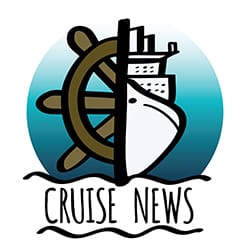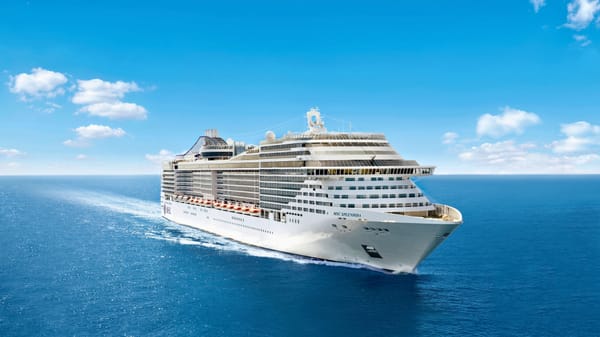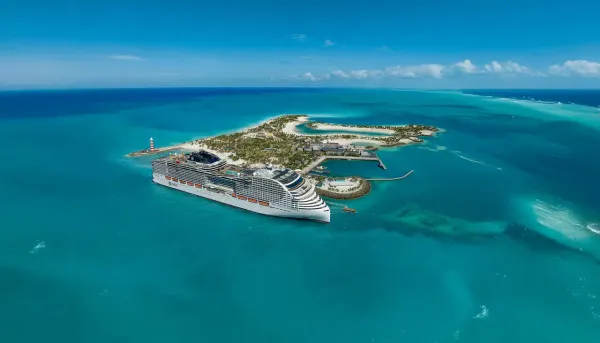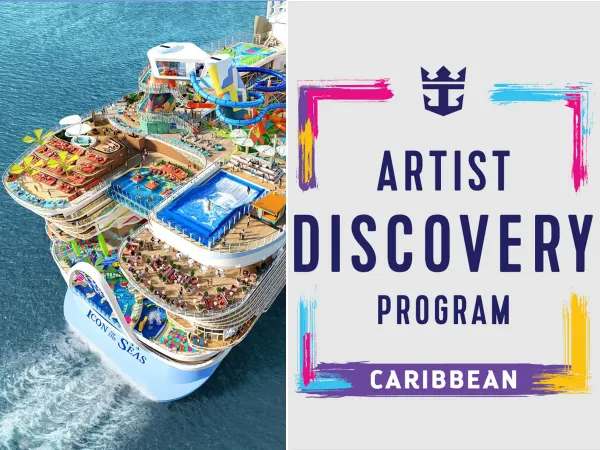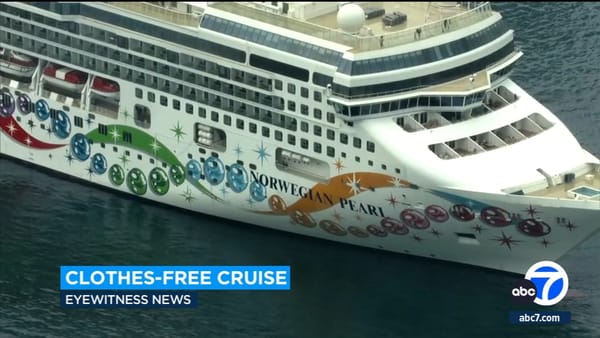HD Hyundai, DNV, and TUI Cruises Advance SOFC Technology for Cleaner Ships
The partnership brings together engineering, regulatory, and operational expertise to advance fuel cell adoption on cruise ships, supporting Europe’s push for cleaner maritime travel and technology innovation.
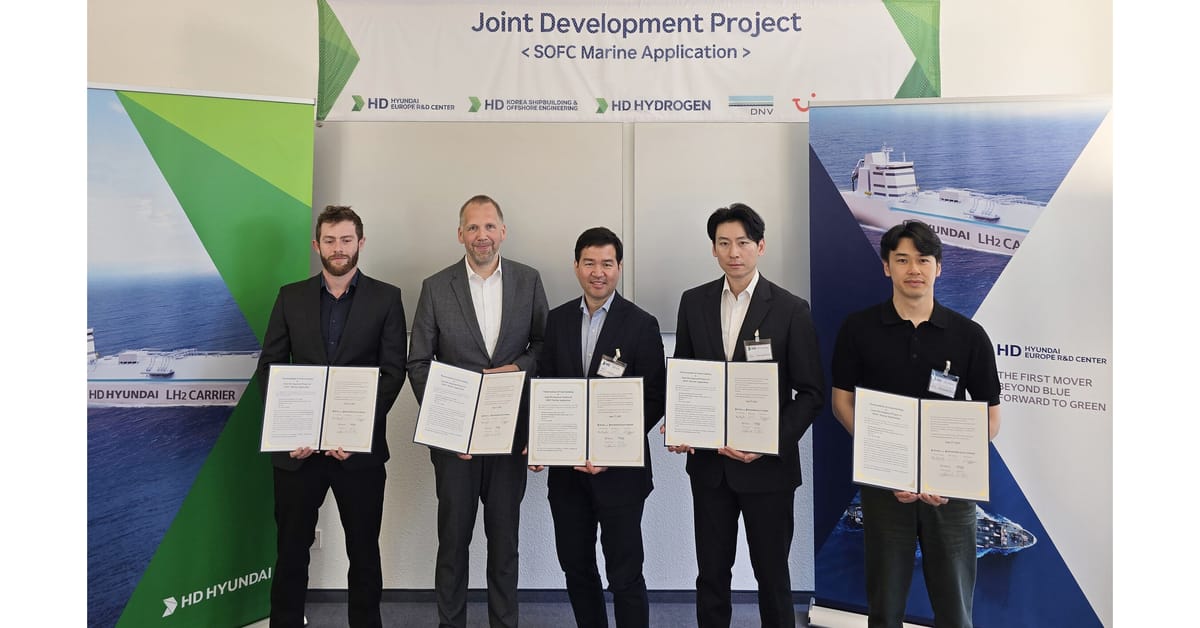
HD Hyundai has signed a Joint Development Project (JDP) with classification society DNV and German cruise operator TUI Cruises to deploy Solid Oxide Fuel Cell (SOFC) systems on cruise vessels, aiming to meet stringent European environmental requirements while enhancing onboard efficiency and reducing emissions. The agreement, signed in Düsseldorf, Germany, spans eight months of development between June 2025 and February 2026. It will translate SOFC technology from concept to ship-ready engineering, factoring in safety, operational, and regulatory considerations specific to the cruise sector.
Focus on SOFC Technology for Cruise Vessels
SOFCs generate electricity through an electrochemical process that combines hydrogen with oxygen, thereby eliminating combustion. This process significantly curtails carbon and pollutant emissions, making SOFCs attractive for maritime applications. For cruise operations, key advantages include:
- Lower Emissions: Reduced carbon and pollutant outputs compared with traditional engine-driven generators.
- High Efficiency: SOFCs maintain consistent electrical output at high efficiency, ideal for hotel loads and auxiliary power needs.
- Passenger Comfort: Minimal noise and vibration improve the onboard experience for guests.
- Fuel Flexibility: Potential for hydrogen or ammonia as fuel sources, supporting future transitions to lower-carbon alternatives.
Project Scope and Timeline
The JDP formalizes roles among HD Hyundai’s affiliates, HD Korea Shipbuilding & Offshore Engineering, HD Europe Research & Development Center, and HD Hydrogen, along with DNV and TUI Cruises. Key areas of focus include:
- Safety Design Standards: Establishing guidelines for integrating SOFC units into cruise vessels, ensuring compatibility with existing ship systems.
- Performance Testing: Evaluating SOFC reliability under varied cruising conditions and developing CO₂-reduction strategies such as waste-heat recovery.
- Regulatory Compliance: DNV will oversee safety, class rules, and emerging alternative-fuel requirements from the initial design stage.
- Operational Insights: TUI Cruises will provide ship-specific data and installation constraints, ensuring real-world feasibility and alignment with passenger operations.
This eight-month effort runs from June 2025 through February 2026, culminating in safety design guidelines and engineering frameworks for potential pilot installations aboard TUI Cruises vessels and other ships.
European Market and Regulatory Imperatives
Europe’s environmental regulations and decarbonization targets create a strong demand for cleaner propulsion technologies, especially in sectors like cruising where hotel loads and comfort standards are paramount. HD Hyundai, which launched HD Hydrogen in 2024 to accelerate fuel cell development, positions this JDP as a strategic entry to meet Europe’s evolving maritime emissions goals. Market research cited by the company anticipates the global SOFC sector will expand at a 40.7% compound annual growth rate to reach USD 7.12 billion by 2030, driven by rising adoption in maritime and stationary power applications.
DNV’s classification oversight will address potential engineering and safety hurdles, from thermal management to fuel handling. The high operating temperatures of SOFC systems, often between 600°C and 1,000°C, present opportunities for waste-heat recovery, and HD Hyundai plans to explore partial carbon capture to further mitigate greenhouse gases.
Stakeholder Perspectives
A representative from HD Hyundai emphasized the importance of this initiative, stating, “This international joint development project marks a significant milestone in demonstrating HD Hyundai’s world-class decarbonization technology for ships in the European market.”
DNV stated that it will support the project from the initial design phase to ensure a smooth approval pathway, offering regulatory insights needed for class certification. TUI Cruises confirmed it will provide dedicated operational profiles, port integration details, and space-allocation requirements so that SOFCs can be adapted effectively within a cruise environment.
Future Applications and Outlook
Over the eight-month development window, the partners aim to validate SOFC performance in cruise-specific conditions and develop comprehensive safety policies that address new fuel options. Lessons learned could inform broader maritime adoption beyond the cruise sector, as SOFC applications may be extended to cargo ships and other vessel types. HD Hyundai’s continued collaboration with international stakeholders underscores the growing focus on propulsion innovations capable of meeting, not merely adapting to, tightening global emissions rules.
Frequently Asked Questions (FAQs)
What is a Solid Oxide Fuel Cell (SOFC)?
A Solid Oxide Fuel Cell is a high-temperature electrochemical system that generates electricity by combining hydrogen with oxygen. Its ability to operate without combustion improves efficiency and reduces carbon and pollutant emissions.
How could SOFCs reduce cruise ship emissions?
Because SOFCs do not burn fuel, they emit fewer greenhouse gases and pollutants compared to engine-based generators. Actual overall emissions depend on how the hydrogen or hydrogen carrier fuel is produced.
What roles do DNV and TUI Cruises play in this project?
DNV ensures the SOFC systems meet international and class regulatory requirements, providing expertise on fuel handling, safety standards, and compliance. TUI Cruises supplies operational data and ship-specific installation details to align the final SOFC designs with practical cruise industry needs.
When will the project’s findings be implemented?
The core development phase extends from June 2025 through February 2026. After that, the findings could be integrated into pilot programs aboard TUI Cruises ships or other vessels, based on further testing and approvals.
Can SOFC waste heat be used on board?
Yes. SOFCs generate high-temperature exhaust that can be captured for auxiliary power or heating. HD Hyundai and its partners plan to explore such waste-heat recovery mechanisms to improve overall energy efficiency.
By establishing localized safety standards, validating SOFC performance, and incorporating real-world cruise operations, the JDP partners aim to foster a new generation of low-emission maritime systems. This approach reflects a broader industry transition toward sustainable vessel technologies and paves the way for more environmentally responsible cruising.
